
Timebanks: How to Share Time When Dollars Are Scarce
During the last two great depressions in the U.S., hundreds of thousands (possibly millions) of people organized to meet their basic needs when the mainstream economy and centralized monetary system failed them. Unemployed poor folks got together to create time dollar stores and cooperative mills, farms, health care systems, foundries, repair and recycling facilities, distribution warehouses, and a myriad of other service exchanges. Many of these were based on the hour as a unit of account, and often everyone’s hour was equal and could either be exchanged for another hour of service or its equivalent in goods.




